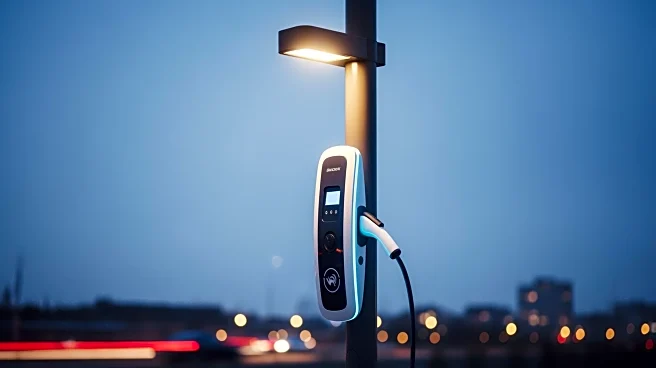What's Happening?
Voltpost, a startup founded in Brooklyn, New York, is innovating by converting lampposts into electric vehicle charging stations. This initiative aims to provide convenient charging solutions for city
residents, particularly those living in apartments without access to private garages. The company offers Level 2 chargers, which are slower but can be installed quickly and cost-effectively. Despite its growth and expansion across several states, Voltpost faces challenges due to the Trump administration's suspension of federal funding for green projects. The company had secured a $2.6 million federal grant for chargers, but the program was frozen, impacting its operations. Voltpost continues to expand with private investments and partnerships with cities and corporations.
Why It's Important?
The transformation of lampposts into charging stations by Voltpost represents a significant step towards increasing electric vehicle adoption in urban areas. This innovation addresses the infrastructure gap for EV charging, crucial for the transition to sustainable transportation. However, the suspension of federal funding under the Trump administration poses a challenge, potentially slowing down the deployment of necessary infrastructure. This situation highlights the reliance on private sector investment and local government support to advance clean energy initiatives. The broader impact includes potential setbacks in achieving national goals for EV adoption and maintaining competitiveness in the global market, particularly against countries like China.
What's Next?
Voltpost plans to continue its expansion across the U.S., leveraging private investments and state-level support. The company is working with partners like Zipcar and utilities to enhance access to charging stations, especially in underserved communities. The Biden administration's goal of 500,000 public chargers by 2030 remains a target, with most funding expected from private investments. The ongoing legal and political battles over federal funding could influence future developments in EV infrastructure. Companies like Voltpost may need to adapt their business models to navigate these uncertainties and continue contributing to the clean energy transition.
Beyond the Headlines
The efforts by Voltpost and similar companies reflect a broader cultural shift towards sustainable transportation and energy independence. Despite political challenges, the demand for clean air and reduced noise pollution from gas vehicles continues to drive innovation. The transition to electric vehicles is seen as inevitable, akin to technological shifts like the move from DVDs to streaming services. This underscores the importance of developing resilient business models that can thrive amid changing political landscapes and contribute to long-term environmental goals.









